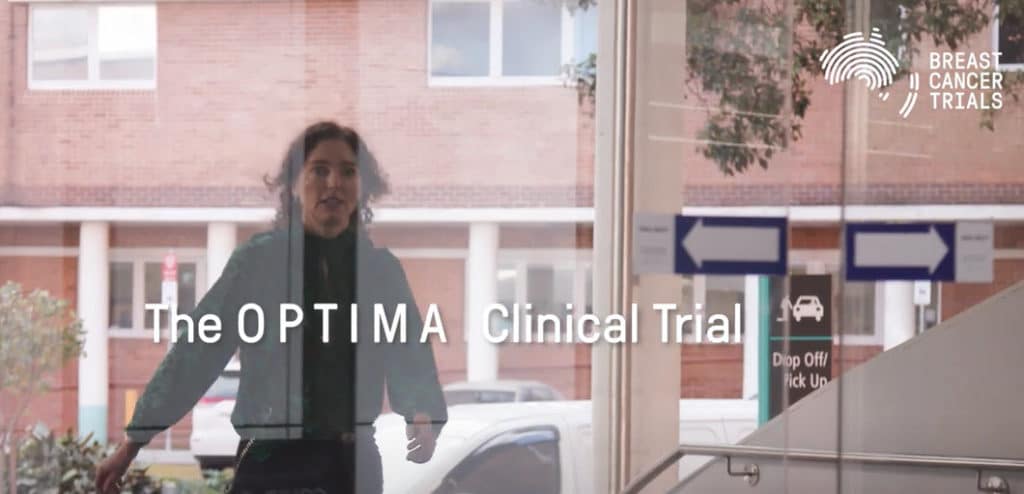- Research
- 2022-2026 Research Strategy
- Open Clinical Trials
- Closed Clinical Trials
- What is a Clinical Trial?
- Why Participate in a Clinical Trial
- Remote Telehealth Pre-Screening Process
- Research Achievements
- Publications
- Research Development and Funding
- Participating Institutions
- International Collaboration
- BCT Trials & Projects Summary
- Translational Research
- Clinical Fellowship Program
- International Fellowship Support
- Annual Scientific Meeting
- Travel Grants and Awards
- About
- Our Impact
- Fundraise
- Donate
- Researcher Login
- Cart
The OPTIMA Clinical Trial
The purpose of OPTIMA is to find out if using a test called ‘Prosigna’ can help make safe and accurate decisions about whether or not chemotherapy treatment is needed.
People with ER-positive, HER2-negative breast cancer are usually offered both chemotherapy and hormone (endocrine) treatment to reduce the risk of the cancer coming back in the breast or elsewhere. Currently we don’t have a single test that can tell us whether or not someone might benefit from chemotherapy, so some people may receive chemotherapy who don’t need it. Chemotherapy can have unpleasant short- and long-term side-effects.
There are now several tests which give more accurate information about individual breast cancers than the usual methods by looking at how active the genes are in breast cancer cells. The tests use a sample of the cancer (tissue sample) already removed by the surgeon. We need to do more research into how best to use the tests. Some research that has already been done suggests that the tests could be used to find patients who don’t need chemotherapy but will still have the cancer treated effectively. Giving less treatment with the same or better results is called ‘de-escalation’ or ‘de-intensification’ and can optimise treatment to best suit each patient.
There is some evidence to suggest that the Prosigna test is effective at predicting if patients with breast cancer which has spread to lymph nodes or with larger cancers are likely to benefit from chemotherapy. However, we might find out in the future that some patients who did not receive chemotherapy in the OPTIMA study, might have benefited from it. This is why we are doing OPTIMA – we need better evidence about how well the Prosigna test works.
Following consent, all participants will provide a tumour sample from their surgery and will be randomised. The sample will be sent to Sydney, Australia for Prosigna testing.
Treatment with chemotherapy and hormone treatment is blinded: participants and doctors won’t know if the Prosigna test decided treatment. Participants may have chemotherapy because they are randomised to Group 1 (usual treatment) or they may have been randomised to Group 2 as the Prosigna test predicted a benefit from chemotherapy.
OPTIMA has been open in the UK, Sweden and Norway since 2017. The study aims to recruit 4500 participants; BCT will contribute at least 300 participants from 50 sites across Australia and New Zealand.

Dr Belinda Kiely is the BCT Study Chair for the OPTIMA study.




